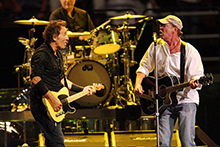
By the time 23-year-old Bruce Springsteen officially introduced the E Street Band in October 1972, he’d already put together at least half-a-dozen musical groups, building a core of backing musicians and experimenting with different kinds of lineups.
Among Springsteen’s notable efforts: the Castiles, his first serious mid-’60s band; Steel Mill, a long-haired hard rock outfit that toured the country and opened for some major acts of the era; and The Friendly Enemies as well as Dr. Zoom and the Sonic Boom, two big ensembles that Springsteen built expressly for a couple of memorable shows. These last two lineups played just one and two gigs, respectively, but they’re still remembered as the first time Springsteen combined some of his core rock musicians with horns and other enhancements that tapped into the R&B traditions of the Jersey Shore.
If you’re interested in the toolkit Bruce Springsteen used to engineer his sound, here are five bands you should know about:
1. The Broadways. While Springsteen’s own earliest musical efforts were part of the ’60s wave of garage bands, important elements of his mature sound started with the African-American vocal groups that coalesced around some key players starting in the mid-’50s. “Before Bruce Springsteen and the E Street Band, the Broadways were the kings of Asbury Park,” writes Chris Jordan in the Asbury Park Press. “They owned the summer of ’64 in the city with their hit, ‘Going, Going Gone’ on MGM Records.” The Broadways featured a roster of the town’s best vocalists, including Billy Brown, Ray Morris, Leon Trent and Ron Coleman; they were also backed by the West Side’s strongest players, including a young saxophonist named Clarence Clemons.“The West Side guys had a strong influence on what became known as the Sound of Asbury Park,” Springsteen told the Asbury Park Press in 2011. “There was a moment when the scenes (rock, doo-wop and R&B) crossed over, and I opened for the Broadways.”
2. The Uniques. In addition to the Broadways, Brown, Morris, Trent and Coleman were among the members of the Uniques, a band that also included Italian-American vocalists Sam Siciliano and Nick Addeo. The Uniques were managed by “Stormin'” Norman Seldin, a prodigious young promoter and musician from Red Bank, N.J., who had begun managing bands at age 14; a few years later, Seldin’s band the Joyful Noyze would feature peripatetic saxophonist Clarence Clemons.
3. The Jaywalkers. Founded in 1958 and fueled over its 10-year run by a steady turnover of musicians, the Jaywalkers were the most popular cover band on the Jersey Shore — and a training ground for future E Street Band members Steve Van Zandt, Garry Tallent and David Sancious.
4. Sunny Jim. A frequent opening act for the Bruce Springsteen Band at the turn of the ’70s, Sunny Jim featured Springsteen’s former Castiles bandmates Bob Alfano (keyboards) and Vinnie Maniello (drums). They also shared Steel Mill manager “Tinker” West, whose Surfboard Factory in Highlands, New Jersey, served as a practice space for both bands — and the location for this practice tape, one of the few available recordings of Sunny Jim.
5. Mercy Flight/Robbin Thompson. Starting early in its existence (when the band was still called Child), Springsteen’s Steel Mill frequently made the drive down to Richmond, Virginia, to play gigs in clubs there as well as venues around Virginia Commonwealth University. A regular opening act was a band called Mercy Flight, a group of VCU college students whose guitarist Tom “Cool” Yolton credits Steel Mill with inspiring them to start writing their own material. (None of Mercy Flight’s performances seem to have surfaced online.)
Mercy Flight’s faithful support of Steel Mill took a poignant turn in August 1970, when the band’s lead vocalist Robbin Thompson abruptly quit Mercy Flight join Steel Mill. “Apparently there were discussions going on behind people’s backs, and the members of Mercy Flight were the last to know,” Yolton wrote decades later. “To this day I’m still puzzled at Springsteen’s need for our singer, but by the next week Robbin had packed his stuff and headed to Asbury Park, N.J.” Thompson’s tenure with Steel Mill would last less than six months, until January 1971. Mercy Flight would continue without Thompson until breaking up in 1973; from his return to Richmond until his death in October 2015, Thompson pursued a productive career as a singer/songwriter. He was eulogized by Springsteen as “a a great guy and a great musician. He will sorely be missed by all of us here on E Street.”